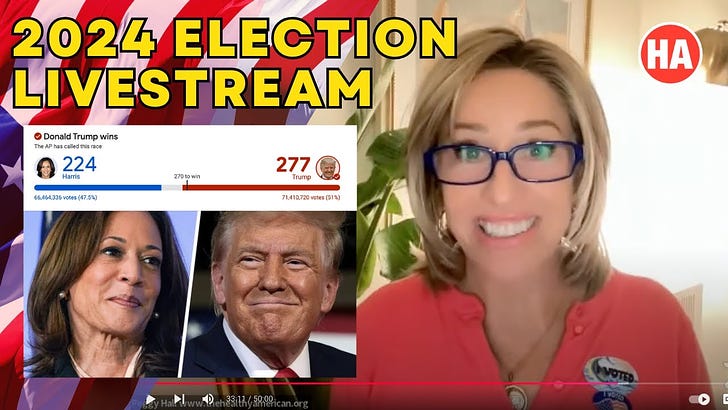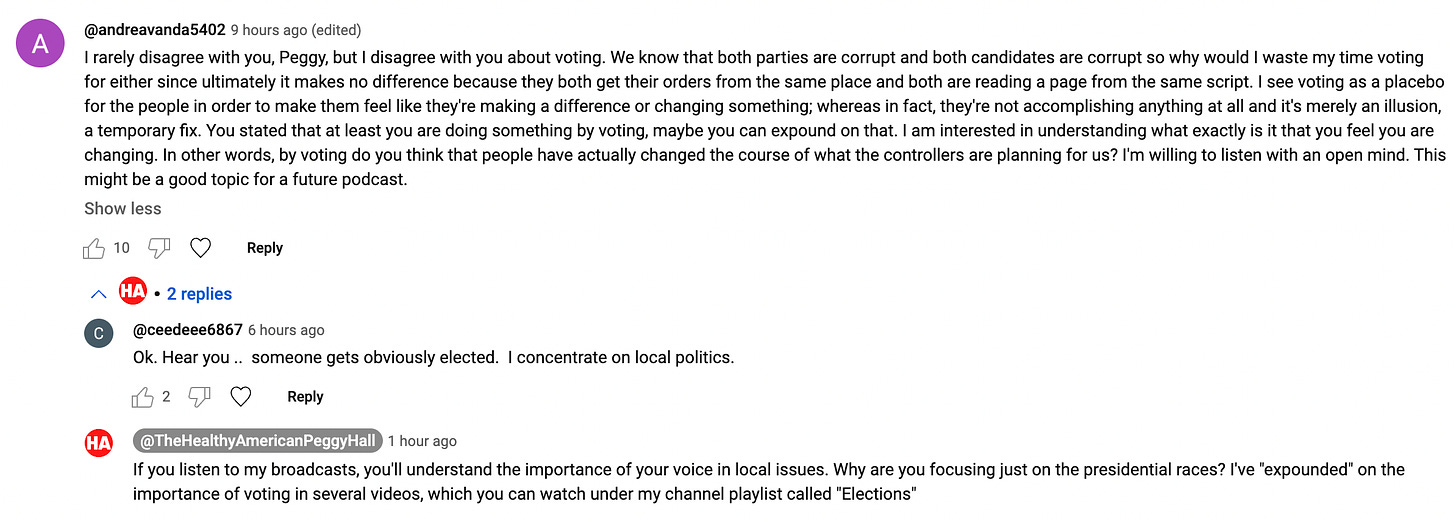How the President is Elected
🇺🇸 The electoral college is a unique system for states to elect the US President. I explain how it works and why this safeguards our federal constitutional republic.
In last nights election livestream I dived into why the popular vote doesn’t actually hold the weight some people think it does. I explained the Electoral College—what it is, how it works, and why it’s clear evidence that we’re not a pure democracy, but rather a federal constitutional republic.
Plus, I shared my experience with what it’s like voting in Florida, which is a completely different experience from California—really eye-opening!
I’ve heard from so many of you with comments like this one: "Peggy, I'm so glad you reminded me to take part in this election because of the issues at the state level. I was only focused on the presidential race.”
One of the comments on my video really highlighted this common misconception: the idea that because the presidential election might be “rigged” or predetermined, then no vote matters. This individual was so focused on the issues with the presidential election that they completely overlooked the impact of local elections—the ones that affect our day-to-day lives the most. The constant media circus around presidential elections creates this false narrative and brainwashing that the presidency is where all the power lies, and that’s where we should channel all our political energy.
While our current system has plenty of room for criticism, state and local elections—where laws on specific issues are made—are still a direct way to impact our daily lives. And there’s still value in how our Constitutional Republican system was originally set up.
That got me thinking about our Electoral College — a system created specifically for this country to make sure we’re not just a “pure democracy”—and I know you all know how I feel about that term.
Every time I hear a politician or mainstream media outlet like Tucker Carlson talking about “saving democracy” or “restoring democracy,” it really irks me. Sure, we have democratic elements, but we’re not a democracy; we’re a constitutional republic. A federal constitutional republic, in fact.
Each state is sovereign. Think of each state almost like its own little country. California, for instance, has its own laws, and they’re radically different from what you’ll find in a state like Florida or South Dakota. This is why we have 50 different sets of laws and regulations. However, these are still subject to constitutional limits. The U.S. Constitution ensures a republican form of government for every state. Not a dictatorship, not a monarchy, but a system where citizens choose their leaders and shape their laws.
Our Electoral College is a unique system designed to represent states individually rather than simply tallying national popular votes. It's true: we’re not a pure democracy but a constitutional republic, and each state operates semi-independently within this structure.
The founding idea was to ensure that each state, regardless of its population, would have a voice in federal decisions. This prevents a few highly-populated areas from overwhelming the voices of smaller states, allowing for a balance that is reflective of our country as a whole. So when you vote in a presidential election, your vote contributes to your state’s choice, which its electors then represent in the Electoral College.
I’m all for the Electoral College and here’s why: I reject the idea of a national government, like in Canada or the UK, where the majority rules with parliamentary power. That’s not what the founders wanted for the United States. They debated long and hard to design a fair system that would allow states to retain their independence while also giving us a cohesive federal structure.
Some people think the president can just shut down the whole country. Wrong. The president has no authority over your state. When Trump was blamed for shutting down the country, it wasn’t him doing it—individual governors, like Newsom here in California or Inslee in Washington, took it upon themselves to shut down their states. Each state is its own entity, with its own governor—almost like its own little president, if you will.
So, while the feds can step in on certain issues like interstate travel, defense, and currency, they actually have less power than a lot of people realize. Most of the power lies within each state, which is why I’m here defending freedom every single day, educating on our political system, and arming you with the tools to stand up for your rights.
Look, I know some of you feel disillusioned about voting altogether. “Why even bother?” you ask. But here’s the truth: by not voting, you’re essentially giving the powers-that-be a free pass. I understand the desire to "stick it to the man" and resist, but not voting doesn’t exactly throw off any shackles—it just makes it easier for corruption to flourish without resistance.
Take yesterday, for instance. I cast my vote on Proposition 4 in Florida and against Proposition 3, which only benefits big business interests in the abortion and cannabis industry. That’s my voice, my way of shaping my state’s laws. And it’s a power we each hold, especially on local issues. You don’t have to look far to see how these decisions shape your day-to-day life.
Our founders created a fair system—a federation of states united by common values but with the freedom to live by their own laws. It’s not immune to corruption, but worth defending.
Across history, three primary types of government have arisen to impose order:
Monarchy – rule by one, centralized power in a king or queen.
Aristocracy – rule by a few, where elites wield authority.
Democracy – rule by many, where the majority holds sway.
Monarchies may descend into tyrannies, aristocracies often devolve into oligarchies, where the privileged few entrench their own interests, and pure democracies, though ideally grounded in popular voice, risk turning into “mob rule,” where the majority can suppress individual rights and minority voices. The Founding Fathers recognized this inherent danger in unchecked democracy, leading them to resist a purely democratic model.
Anarchy is another alternative many in the freedom movement advocate for—one idea where people theoretically govern themselves, free from any imposed authority. While some envision it as a path to unrestrained freedom, anarchy's promise of self-governing communities has never proven stable or orderly in reality.
In the real world, anarchy tends to dissolve quickly into disorder, or ironically, people end up pulling together some form of government anyway! The reality is, you can’t just not have a government. You can’t avoid authority. At the end of the day, some kind of central authority—with laws, rules, and protections—is essential to avoid a free-for-all.
The United States sought a different path: a constitutional republic, blending democratic principles with a framework of checks and balances to limit majority rule's excesses.
The United States is the only country in the world that was created with a constitutional republican form of government. Our founders disapproved of "pure" or "unrestricted" democracy, and all other forms of government that have the tendency toward mob control and the suppression of civil liberties and our God-given rights.










To think that this administration wanted to abolish the electoral college says ALOT. We were dealing with people who were Marxist’s/communists and who were ready and willing to get rid of our Constitutional Republic! We were under a communist/marxist rhetoric and we just evaded four more years of that! Praise God for TRUMP! ❤️🇺🇸
"A federal constitutional republic".
Suppose to be a REPRESENTATIVE Constitutional Republic but truly we are not Represented in any meaningful sense of the word. Sadly, we live in an Oligarchy ruled over by the International Money Lenders and their Cronies----including The (inbred) British Crown and their handlers in "Israel". Give your neighbors Harry and Megan my best---with a crowbar.
Crown, Inc.